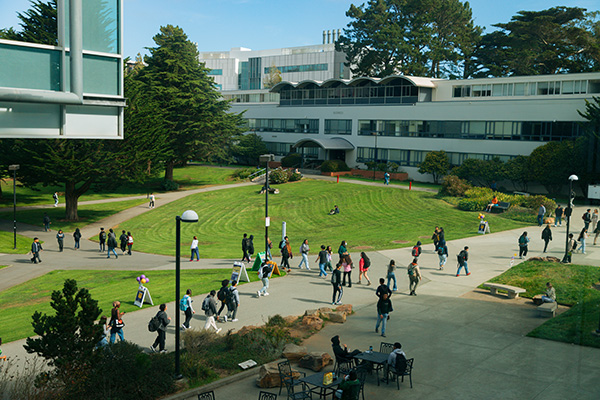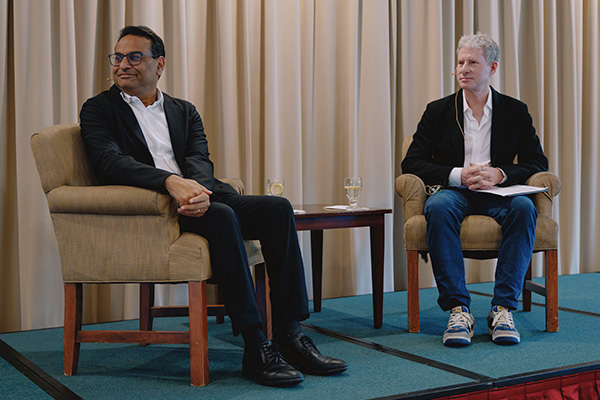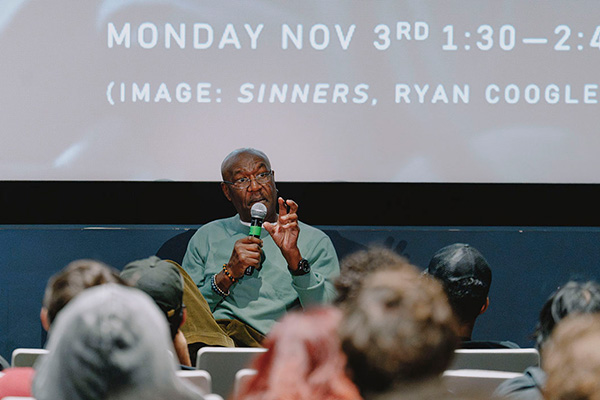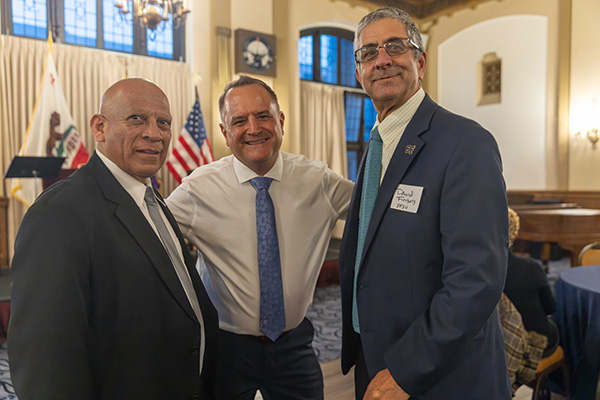News and Announcements

Reinforcing its reputation as a launchpad for student success and a vital driver of the Bay Area’s economy, SFSU stands out in the latest economic impact report released by the CSU system. The report analyzes the CSU’s contributions to California as a whole and at its 23 campuses statewide, through its transformative impact on students as well as the state’s economy, industry and society.
SFSU is among California’s top universities helping students from all backgrounds turn education into meaningful and fulfilling careers. The report shows the degrees earned by SFSU alumni attributes to higher median incomes, totaling $4.2 billion, supporting statewide impacts of over 25,000 jobs. SFSU has also been named among the top 20 affordable colleges with high return on investment by MSN.com. The University received 4.5 out of 5 stars in Money Magazine’s “Best Colleges 2025” rankings.
“The results of the CSU Economic Impact study demonstrate the incredible return on investment that the state receives for support of the CSU,” SFSU President Lynn Mahoney said. “San Francisco State alone generates 9,700 state-level jobs, $717.4 million in wages earned and $101.7 million in tax revenues demonstrating the value of state support for the CSU. We fuel the Bay Area in so many ways, most importantly through the meaningful impact that an SFSU education has on the lives of our alumni and their families.”
The University’s overall impact on the Bay Area region is $1.5 billion in industry activity. For every $1 the state of California invests in SFSU, the return on investment yields over $44 when the impact of enhanced alumni earnings is included.
The report cites SFSU’s Criminal Justice Studies Department as an example of a program bridging classrooms and communities. Students intern with organizations that provide legal aid, re-entry support, youth mentorship and victim advocacy, expanding the capacity to serve marginalized populations, including formerly incarcerated individuals, at-risk youth and survivors of domestic violence. The report also cites awards SFSU’s graduate program in biomedical science and biotechnology, leveraging partnerships with Bay Area startups for thesis projects in gene editing, biosensors and biomanufacturing.
As the nation’s most diverse and impactful four-year public university system, the CSU is among the state’s most powerful engines of economic mobility. During the 2023 – 2024 academic year, the CSU supported 210,800 jobs, contributing $13.6 billion in labor income across California, while delivering an overall statewide impact of $31.6 billion.
The study utilizes data from 2023 – 2024 and was conducted by global advisory and digital services provider ICF, an international consulting firm specializing in economic impact studies
Visit the CSU website to view the full report, “Moving California Forward: The Economic Power of the CSU.”

At SFSU, the career paths for our students often zig and zag in different directions. While thousands arrive straight from high school and community college every year in traditional fashion, many Gators gain meaningful experiences in unexpected places during and after their educational pursuits. And nearly one-third of our students are the first in their families to go to college.
This was evident at SFSU’s Lam-Larsen Distinguished Lecture Series on Oct. 28 featuring former Starbucks and Reckitt Chief Executive Officer Laxman Narasimhan in conversation with Ripple co-founder and Executive Chairman Chris Larsen (B.S., ’84). Their wide-ranging talk in the Seven Hills Conference Center explored a variety of topics, including artificial intelligence (AI), labor, education, humanity, disinfectant and, yes, coffee.
Born and raised in India, Narasimhan moved to America as a first-generation college student at University of Pennsylvania’s Wharton School. His passion was writing poetry, but his parents steered him toward a major in Mechanical Engineering.
“I’ll tell you one thing: If I had landed in any other country, I would never have made it. I made it because it was America,” he said.
As AI technology and its burgeoning industry, centered in San Francisco, grows at a fast pace, the fundamental nature of people’s work will change significantly, Narasimhan says.
“I think we’re going to see very non-linear careers ... with non-traditional people, either acquiring non-traditional skills that they’re going to have to relearn and rebuild over time in a non-traditional way,” said Narasimhan, who also was previously the global chief commercial officer for PepsiCo.
When Narasimhan was named Starbucks CEO, he took a six-month detour to work at 38 of its cafes.
“The first day was terrible because my lattes were horrible, and they told me, ‘By the way, this sucks. Go make it again!’” he said. “And I made it again. I dropped food product. I burned my hand. You know, I was, like, ‘Oh, I can't believe this!’ ... Every night I’d sit with them, and I learned their stories.”
He empathized with the baristas, and he gained their trust.
“If you can find a way to be human-centered, if you can find a way to connect with people at scale,” Narasimhan said, “you can actually transform and do what you need to do by winning their hearts and their minds, and, therefore, their hands.”
Students attending the lecture found the talk inspirational.
“I really enjoy being able to hear from successful people. It makes me feel like being at this school is really worth it,” said Azlyn Henri, a student majoring in Business Administration with an emphasis in Marketing.
Throughout his talk and answers to questions from the SFSU students, Narasimhan emphasized empathy and inner strength over money.
“The path to happiness is not to compare. The path to success is to compete with yourself,” he said.
He added: “The question you ask yourself is not: ‘Am I going to be wealthier tomorrow than I am today?’ The question you can ask yourself is: ‘Am I better tomorrow than I was today?’ ... I would urge you to find this inner strength in you. Because you know what really, actually, at the end of the day, drives success long term is how strong you are on the inside.”
Learn more about SFSU’s Lam Family College of Business.
Photo by Alexander Villagomez-Miranda

Award-winning actor and alumnus Delroy Lindo (B.A., ’04) recently spoke to Cinema and Project Rebound students about his career, higher education and much more. He emphasized to both groups the importance of humanity in his work — the biggest drivers in his professional life and what ultimately helped him complete his college degree at SFSU.
Dozens of Cinema students gathered inside SFSU’s Coppola Theatre on Monday, Nov. 3, to listen to the actor answer questions posed by Associate Professor of Cinema Artel Great and fellow Cinema students. He shared anecdotes, reflected on what draws him to certain roles and shared how he prepares for a job.
Third-year Cinema student Brooklynn Filstrup found the talk informative. “Students can benefit from hearing from professionals in the field,” especially ones like Lindo who have gained success in the industry, she adds.
A veteran actor, Lindo has appeared in films, television shows and on the stage since the 1970s. During his visit to campus, he discussed his big screen roles, including four Spike Lee films — “Malcolm X” (1992), “Crooklyn” (1994), “Clockers” (1995) and “Da 5 Bloods” (2020), for which he won a New York Film Critics Circle Award. He also appeared in the films “The Cider House Rules” (1999), “Gone in 60 Seconds” (2000) and many more. His most recent Hollywood picture was playing Delta Slim in Ryan Coogler’s 2025 horror film “Sinners.”
Filstrup was one of the many students in the crowd who planned to enter the entertainment industry after graduation, so Lindo’s answers provided insight into their chosen futures. One student wanted to know what it took to make an actor successful, to which Lindo replied: practice.
“Learn the craft. Become as conversant with the craft as you can become, because there are no guarantees,” Lindo said. “This is an absurdly unfair industry. That’s the playing field that you’re in. ... You better understand it, because if you don’t, you will soon find out. But the way to traverse this hill is to have as much craft at your disposal.”
When Lindo signs on to a project, he does extensive research, he told students. He played Supreme Court Justice Clarence Thomas in the TV biopic “Strange Justice” (1999). He read the book the film was based on and visited Thomas’ hometown in Georgia, where he sat down and chatted with one of Thomas’ childhood friends.
In Spike Lee’s film “Clockers,” Lindo played a drug kingpin named Rodney Little who sold crack cocaine. Rodney was based on an actual person. Before filming began, Lindo went out to Jersey City to repeatedly hang out with the real Rodney. “Now, the point of my doing that was not because I wanted to do an impersonation of this man. No, I needed to get a feel for that world,” Lindo said. “The fact of the matter is Rodney, the character that Spike was asking me to play, I’m nothing like that. I’m not that person and I didn’t know very much about that whole crack world.”
What drew him to that role was the character’s complexity, Lindo says. “This was the central question that I asked myself: ‘Why does a man like Rodney become a father figure to these kids to the point where he can have them on the block selling drugs?’” he said. “That’s what interested me. ... The father figure component. So, I approached the part from the standpoint not of being a drug dealer. I approached the part from the standpoint of being a father figure to these kids and all the kids who I had working for me on the block.”
It’s his mission to show the human condition, he told Project Rebound students in a separate talk. “My job, in all of the work that I have done, is to try to present to the audiences the human being that is inside of that person,” he said. “Human beings who are flawed so that audiences say, ‘Well, yeah, I’ve done that’ or ‘I could do that.’ It’s not about being perfect. It’s about being human with all the flaws that come with being human.”
Acting was always Lindo’s first love, he said. Even though he’s garnered success, his mother was disappointed that he didn’t choose education first. His mom, who grew up in Jamaica, never attended college but wanted that for her son. Although she passed away in 1996, she and Lindo’s own son were the driving forces behind his decision to earn his degree from SFSU. At 50, Lindo graduated with a degree in Cinema and has since maintained a close relationship with the University. He currently serves as a director on SFSU’s Foundation board, in 2021 he spoke at the School of Cinema’s valediction ceremony and that same year he was inducted into the SFSU Alumni Hall of Fame.
“[SFSU] worked with me so that I could do the classes, and I will always have a profound gratitude and appreciation for what State provided me,” he said. “I knew that whenever [it] came time for me to discuss with my son the importance of education, I wanted to be able to be authentic. SF State provided me that opportunity.”
More information about SFSU's School of Cinema can be found online.
The University Police Department (UPD) hosts two donation drives aimed at helping those in need this winter.
UPD’s annual toy drive benefits the San Francisco Fire Department Toy Program. Those wishing to pitch in can bring in a new, unwrapped toy from now through Wednesday, Dec. 17. Drop-off locations can be found at the UPD office on North State Drive (near Lake Merced Boulevard).
UPD is also collecting coats and other winter apparel to benefit the One Warm Coat organization. Bring in new or gently used winter coats, hats and gloves from now through Dec. 18. Donations can be dropped off in the lobby of the UPD office and the Office of Human Resources in Administration 252.
CampusMemo will go on winter hiatus after Monday, Dec. 15. We will resume publication on Tuesday, Jan. 21. For questions, please email the Office of Strategic Marketing and Communications at marcomm@sfsu.edu.
The SFSU Academic Senate met on Tuesday, Nov. 18, via Zoom.
The Senate:
- Passed the following items:
- Policy on Requirements for Graduate Students, #S25-295
- M.S. in Earth and Environmental Sciences
- M.A. in Geography, Resource Management and Environmental Planning
- M.N. in Africa and Globalization
- M.N. in Accounting
- Heard in first reading:
- Resolution on Annual Retreat
- Bachelor of Science in Physics, concentration in Physics for Teaching: Discontinuance]
- Master of Science in Nursing, Neonatal Clinical Nurse Specialist (Entry Level): Discontinuance
- Master of Science in Nursing, Neonatal Clinical Nurse Specialist: Discontinuance
- Bachelor of Arts in Comparative and World Literature: Discontinuance
- Master of Arts in Geography: Discontinuance
- Heard presentations from:
- Jamillah Moore, vice president for Student Affairs and Enrollment Management
The Office of Emergency Services is honored to sponsor LISTOS, a free emergency awareness and disaster preparedness program taught entirely in Spanish by San Francisco Fire Department (SFFD) firefighters. It will be held Monday, Dec. 1, 9:30 – 11:30 a.m., in Library 286. It is open to all.
A program under the SFFD Neighborhood Emergency Response Team office, LISTOS is designed to teach the basic ideas of preparedness in one class with consideration for cultural sensitivities and time constraints. The lessons are interactive and discussion based, and participants are encouraged to bring their whole family.
Join the College of Liberal & Creative Arts’ “Research First: A First-Year Showcase of the College Undergraduate Research Experience” on Monday, Dec. 1, 2 – 3:15 p.m., and Thursday, Dec. 4, 11:30 a.m. – 1:30 p.m., in Library 121. The showcase will feature undergraduate research from lower-division classes. Light refreshments will be provided.
San Francisco Math Circle will host a math festival where 2nd-8th graders and their families can explore a variety of hands-on activities on Saturday, Dec. 6, 2 – 4 p.m., on campus. There will be something for everyone, regardless of math background.
San Francisco Math Circle is an enrichment program at the SFSU Center for Science and Math Education that uses puzzles and games to help students develop the creativity, critical thinking and confidence required for effective problem solving.
Admission is $10 per student and $5 for families new to San Francisco Math Circle.
SF State Spotlight

On Nov. 5, the San Francisco Disability Business Alliance (SFDBA) hosted its fifth anniversary and annual Bay Area Disability Entrepreneurship event and Boost Awards, celebrating innovation, inclusion and disability-owned businesses across the Bay Area. Founded and led by Special Education Lecturer Faculty Peter DeHaas, executive director of SFDBA, the event brought together more than 100 participants, including students, entrepreneurs, community leaders and policymakers.
SFSU Special Education students William Villabos, Abbie Tisdale, Ari Railey and Olivia Howell volunteered to support logistics, vendor coordination, accessibility and guest engagement. Former students Phoebe Phuong-Nguyen Tong and Leinad Rivas also contributed.
“This event is about creating opportunity and visibility for entrepreneurs with disabilities,” said Peter DeHaas. “It’s inspiring to see SFSU students take such an active role in supporting that mission.”
Guests included state Sen. Scott Wiener, San Francisco Assessor Joaquin Torres, other city officials and SFSU Executive Director of Fundraising David Fierberg. The event featured disability-owned business vendors from the SFDBA network, resources from the Small Business Development Center and the California Department of Rehabilitation, live music, food and networking. The celebration concluded with $5,000 in Boost Awards presented to entrepreneurs advancing their next stage of business growth.
The students’ contributions reflect SFSU’s commitment to equity, inclusion and civic engagement through experiential learning, DeHaas adds. He congratulates the students and SFDBA for another successful year empowering disability entrepreneurship.
Photo courtesy of Peter DeHaas
SFSU Gators wrestling is profiled in a Nov. 13 article on the website of the National Collegiate Athletic Association (NCAA) exploring the team’s global flair: “San Francisco State is a program loaded with international talent that has honed its skills not simply on the West Coast, but the world over.”
Three Gator wrestlers are on the Mexico national wrestling team, with others representing Puerto Rico, Brazil and the Philippines. Coach Jason Welch says he has recruited the team’s athletes with diversity in mind.
“This is something that I specifically built into our program when I came to San Francisco State as something that we could uniquely focus on,” he said. “We have a very diverse group of student athletes, many of whom are first or second generation and eligible to compete for a foreign national team. This also reflects our recruiting pool in California. So, it was a strategic move to make this something that we specialize in.”
“No Separate Survival,” a film by Shabnam Piryaei, associate professor of Broadcast and Electronic Communication Arts, won Best Documentary from the Film Consortium and San Diego Film Week on Nov. 16.
The film’s next screening is at Freight and Salvage in Berkeley on Sunday, Jan. 4.
A Nov. 17 article in BoxLife Magazine covers research by Professor of Kinesiology Jimmy Bagley and faculty from CSU Fullerton and Cal Poly Pomona on the physiological impact of lifestyle on a set of identical twins they have followed for the past 30 years.
One of the twins is an Ironman triathlete and high school coach. The other is a long-haul truck driver with a largely sedentary lifestyle.
“This study proves your genes aren’t a copout,” Bagley said. “You might have a harder starting point, but the decisions you make — whether to move, eat better or stay active — still matter a lot.”